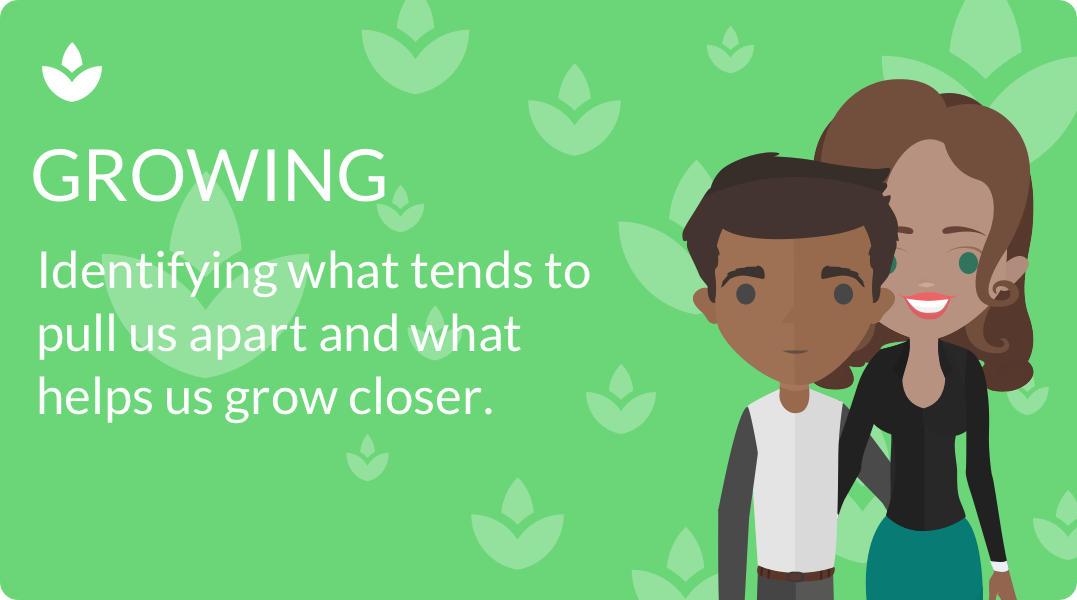I felt unhappy.
We argued a lot over everyday things — money, tidiness, timekeeping and more. Mark said I was controlling …and I felt he gave more attention to his work and other things than me.
Where were the smiles …the laughter …and what happened to fun?
We weren’t good at conflict: he would lose his temper and shout and then I would walk out of the room. It was difficult to resolve anything. Actually I felt that we were stuck in a cycle and didn’t know how to get out of it. I think we both still loved each other but the unresolved problems in our relationship were chipping away at our intimacy.
Many couples experience challenging times in their relationship. It could be annoying habits, difficult circumstances, issues from the past …and more. It is normal to experience problems, although social media can make us feel like everyone else is having a great time (and that ‘problem’ is a dirty word, but it’s not, everyone faces difficulties at some point in their lives).
The question is: what are you going to do about them?

We all know that there is no magic pill that will make everything better. You can leave, but divorce and separation aren’t easy options (friends who have done it say it’s incredibly painful and I’ve heard regrets expressed too). You may also find that problems repeat themselves in other relationships.
The other option is to tackle issues and come through them. Our marriage came close to divorce after seven years together but we got through and now I can honestly say we are happier and closer than ever (we celebrated our 36 years anniversary this year!)
Having said all that, how do you fix relationship problems? Here are 8 tips based on my experience and what other experts say.
1. You can only change yourself
You can’t change other people, much as we might like to try! The good news is that by changing the way we think and behave we can influence our partner and help them to make changes.
TIP — The next time you get into an argument…
TRY NOT TO REACT, and instead
NOTICE what’s going on
REFLECT, by taking time later to think about what happened, how you felt, what you did and what you might do differently another time.
2. Don’t think the worst
It’s very easy to assign negative motives to other people and think the worst: “she doesn’t really care because she’s always late home, maybe she’s seeing someone else…” When you do this you are pre-judging a situation. It could be that your partner is under unusual pressure at work, or there are other reasons she’s regularly home late.
TIP — Check your thinking. Ask your partner what is going on in their world, without judging or accusing: “You’ve been late home a lot recently, how are things at work?”’
3. Do something different
Following on from 1. work on dropping your bad habits and pick up new good ones. Toucan Together is a free app for couples that helps you develop new life habits and relationship skills.
TIP — If for example your tendency is to get defensive in an argument, then stop, count to 10 (…or 100!) and try to really listen to your partner instead: “I see you’re upset. It would be good if we work on sorting this together. Tell me what has annoyed you and what I could have done differently.”
4. Use ‘we’ rather than ‘me’
It really helps to think about what language you use. Research shows that couples who use ‘we’ when negotiating issues do better because of the team mentality.
TIP — Next time there’s an issue, instead of saying: “I don’t know what to do”, or “what are you going to do”, ask: “what could we do about this?”

5. Be compassionate
No one is perfect and it’s pointless playing the blame game, which only intensifies arguments. I realised only later that I was part of the problem in our many years of unresolved conflict because I was avoiding having difficult conversations. Trying to see things from my partner’s point of view helped.
TIP — Show your partner that you empathise: “I can see this is hard for you. What can I do to help?”
6. Positively state your need
We may not realise it but we might be expecting our partner to be a mind reader and to simply know what we need or want. They almost certainly don’t.
TIP — If you’re frustrated that your partner isn’t meeting a need, ask them calmly and kindly to meet your need: “I know we’re both busy but I could really do with your help today, can you pick up a few things from the shops on your way home tonight please, I’ve got a list?”
7. Do kind things
It’s easy to focus on the negative and lose love. DOING something loving for your partner can help them feel more loving towards you and can actually help you to feel more positive towards them.
TIP — Try doing small, kind things for your partner without expecting anything back eg bring them a cup of coffee and favourite treat.
8. Find help before problems become critical
Many couples wait until problems have reached boiling point before getting help, and if that’s you then all is not lost, reach out to trusted friends or a mentor couple and, or seek professional couple counselling. Check out our blog: Couple relationship counselling — how does it work, and does it help?
Some complex and serious issues eg infidelity will benefit from professional counseling. There are many issues that you can resolve as a couple with some helpful input. Toucan Together is a free app for couples that will help you learn more about yourself and your partner. Toucan enables you to have positive conversations around a range of topics: communication, conflict, money, love, sex and more, as well as develop great life skills. Use Toucan individually and together, it’s totally flexible and you set the pace. Start by taking the ‘pulse’ quiz and see a map of your relationship across 7 key indicators. GET STARTED | FIND OUT MORE


